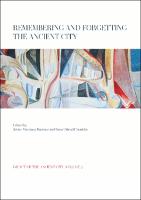Remembering and Forgetting the Ancient City
Contributor(s)
Martínez Jiménez, Javier (editor)
Ottewill-Soulsby, Sam (editor)
Collection
Knowledge Unlatched (KU); European Research Council (ERC)Language
EnglishAbstract
The Greco-Roman world is identified in the modern mind by its cities. This includes both specific places such as Athens and Rome, but also an instantly recognizable style of urbanism wrought in marble and lived in by teeming tunic-clad crowds. Selective and misleading this vision may be, but it speaks to the continuing importance these ancient cities have had in the centuries that followed and the extent to which they define the period in subsequent memory. Although there is much that is mysterious about them, the cities of the Roman Mediterranean are, for the most part, historically known. That the names and pasts of these cities remain known to us is the product of an extraordinary process of remembering and forgetting stretching back to antiquity that took place throughout the former Roman world. This volume tackles this subject of the survival and transformation of the ancient city through memory, drawing upon the methodological and theoretical lenses of memory studies and resilience theory to view the way the Greco-Roman city lived and vanished for the generations that separate the present from antiquity.This book analyzes the different ways in which urban communities of the post-Antique world have tried to understand and relate to the ancient city on their own terms, examining it as a process of forgetting as well as remembering. Many aspects of the ancient city were let go as time passed, but those elements that survived, that were actively remembered, have shaped the many understandings of what it was. In order to do so, this volume assembles specialists in multiple fields to bring their perspectives to bear on the subject through eleven case studies that range from late Antiquity to the mid-twentieth century, and from the Iberian Peninsula to Iran. Through the examination of archaeological remains, changing urban layouts and chronicles, travel guides and pamphlets, they track how the ancient city was made useful or consigned to oblivion.
Keywords
History; Ancient; Rome; Social Science; ArchaeologyISBN
9781789258189Publisher
Oxbow BooksPublisher website
https://www.oxbowbooks.com/oxbow/Publication date and place
2022Grantor
Imprint
Oxbow BooksClassification
European history
Archaeology


 Download
Download